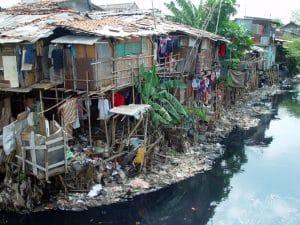 World Water Week in Stockholm is an annual event that focuses on global water issues. One of the key aspects of World Water Week is the coming together of industry experts in an effort to brainstorm and develop solutions to the world’s most pressing water-related issues.
World Water Week in Stockholm is an annual event that focuses on global water issues. One of the key aspects of World Water Week is the coming together of industry experts in an effort to brainstorm and develop solutions to the world’s most pressing water-related issues.
World Water Week is organized by the Stockholm International Water Institute (SIWI), whose vision is a water wise world where the unique value of water is recognized and where water is shared and allocated sustainably, equitably, and efficiently to meet everyone’s basic needs. This year’s theme is Water for Sustainable Growth, and also marks the 20th jubilee of the Stockholm Junior Water Prize. In 2015, over 3,300 individuals and close to 300 organizations from 130 countries participated in World Water Week.
Importance of Water for Sustainable Growth
As the global population continues to increase exponentially, it has become absolutely critical that natural resources be utilized sustainably — and water is arguably the world’s most precious resource. While water is a necessary part of every aspect of life, water availability will be of particular import in five key areas, expanded below.
Agriculture
 Agriculture is not only critical to nourishing the global population, it is also far and away the most aggressive consumer of water. In fact, 70% of water withdrawals worldwide are for agriculture. Add to this the fact that by 2050 global agriculture will need to produce 60% more food in order to feed the burgeoning population, and it becomes clear that finding ways to farm sustainably is not only prudent, but necessary. The most sustainable form of agriculture comes in the form of rain fed crops. However, only about half of agriculture that has the potential to be rain fed is currently doing so. The rest is relying on irrigation and water withdrawals. Therefore, a key goal for the future is to convert these irrigated crops into ones that are watered naturally, with rainfall.
Agriculture is not only critical to nourishing the global population, it is also far and away the most aggressive consumer of water. In fact, 70% of water withdrawals worldwide are for agriculture. Add to this the fact that by 2050 global agriculture will need to produce 60% more food in order to feed the burgeoning population, and it becomes clear that finding ways to farm sustainably is not only prudent, but necessary. The most sustainable form of agriculture comes in the form of rain fed crops. However, only about half of agriculture that has the potential to be rain fed is currently doing so. The rest is relying on irrigation and water withdrawals. Therefore, a key goal for the future is to convert these irrigated crops into ones that are watered naturally, with rainfall.
Industry
The second largest consumers of water are industry and energy, which combined account for 20% of the global water demand. Most of this demand is, of course, from developed countries, since underdeveloped countries typically are dominated by agriculture. Therefore, there exists a serious imbalance in industrial water usage and concern over the future as industrialization spreads as these underdeveloped nations expand. Therefore, water experts are working together to find ways in which all nations can benefit from industrialization while avoiding unsustainable impacts on water demand as well as other natural resources.
Domestic
 Domestic usage only accounts for 10% of total water demand, but its impacts are arguably the most important. Lack of improved water and sanitation is one of the largest contributors to poverty, illness, and lack of education worldwide. Even with the incredible strides made in the United Nation’s goal to provide improved water and sanitation to all people, an estimated 748 million people still lack access to an improved source of water and 2.5 billion still lack access to improved sanitation. One of the key goals of water for sustainable growth is finding ways in which to unequivocally ensure safe, clean water and hygienic, private sanitation to all inhabitants on the planet.
Domestic usage only accounts for 10% of total water demand, but its impacts are arguably the most important. Lack of improved water and sanitation is one of the largest contributors to poverty, illness, and lack of education worldwide. Even with the incredible strides made in the United Nation’s goal to provide improved water and sanitation to all people, an estimated 748 million people still lack access to an improved source of water and 2.5 billion still lack access to improved sanitation. One of the key goals of water for sustainable growth is finding ways in which to unequivocally ensure safe, clean water and hygienic, private sanitation to all inhabitants on the planet.
Ecosystems
Adding to the challenge of water for sustainable growth for agriculture, industry, and domestic usage is the fact that climate change and an ever-increasing population have created a significant impact on our environment. Sustainable development has been a buzzword for decades, and yet most efforts have been largely unsuccessful. Rainforests have been stripped, aquifers practically drained, air quality degraded, and soils contaminated. No longer can sustainable development be a catch phrase or theory – the time has come for a proactive, targeted response to the global ecological crisis, including water supply and demand. Fortunately, savvy water and ecological experts from around the globe are currently working hard towards a sustainable future for generations to come.
Cities
 Currently, over half of the global population resides in cities, and that number is expected to increase to over two-thirds of the nine billion global inhabitants by 2050. Most of this increase will happen in developed nations, which will tax infrastructure and likely increase areas of impoverished living conditions. Already in the United States are areas, such as Navajo Nation and the Texas Colonias, that are in many ways similar to those in underdeveloped nations in terms of infrastructure and resource availability. And, with the influx of urban residents, those areas of substandard living conditions are likely to increase – and not just in America. In fact, it is predicted that, without proactive planning, global urban populations will almost certainly experience a serious degradation in living conditions, including inadequate water and sanitation facilities. Therefore, the sustainable development of water resources for not only economic and industrial growth, but also for social equality and justice will be key to the sustainable development of urban areas.
Currently, over half of the global population resides in cities, and that number is expected to increase to over two-thirds of the nine billion global inhabitants by 2050. Most of this increase will happen in developed nations, which will tax infrastructure and likely increase areas of impoverished living conditions. Already in the United States are areas, such as Navajo Nation and the Texas Colonias, that are in many ways similar to those in underdeveloped nations in terms of infrastructure and resource availability. And, with the influx of urban residents, those areas of substandard living conditions are likely to increase – and not just in America. In fact, it is predicted that, without proactive planning, global urban populations will almost certainly experience a serious degradation in living conditions, including inadequate water and sanitation facilities. Therefore, the sustainable development of water resources for not only economic and industrial growth, but also for social equality and justice will be key to the sustainable development of urban areas.
In Conclusion
Sustainable development of water resources is paramount for the future health and success of our planet. SIWI’s World Water Week is a way in which experts from around the world are able to meet, discuss, share ideas, and thoughtfully plan for a sustainable future. For more information on World Water Week, including updates, activities, and how you can participate, please visit www.worldwaterweek.org.
